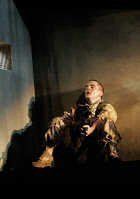Roy Williams's latest play for the RSC uses an old-fashioned three-act structure to tell a very topical story that probably has a great deal of resonance back through the ages.
Opening with a fight between drunken young lads on the streets and some backchat to the police who break it up followed by a trading of foul-mouthed insults between the lads and the girls out on the booze and the pull, the first act reveals that two of the lads, Ben and Jamie, are about to go to Basra in the middle of the Iraq conflict, but both hook up with a girl they've had their eye on for a while Jamie with cynical Hannah and Ben with loud-mouthed, violent Trish before they don their uniforms.
Act two shows them in the middle of the conflict zone with a wounded sergeant and insurgents around every corner as they hide amongst some buildings to wait for reinforcements. The final act is at Steve and Clare's wedding, but it turns out to be a long way from a happy reunion between heroic soldiers and their friends at home. Between the acts are some film diaries made by Ben to send to Trish, with some unwelcome contributions from his fellow soldiers.
The play depicts two very different battlegrounds for these volatile young people: the streets of an urban British town at night filled with drink-fuelled violence and promiscuity and the streets of Basra where hatred and revenge fuel torture and murder in the name of religion, nationalism and peace-keeping. The debates that occasionally arise amongst the young people indicate that those who go to fight have very little understanding or desire to understand the political issues surrounding the conflict or exactly what they will face when they get there. A spell on the front line only further fuels their hatred, leading some to commit acts worse than those allegedly committed by the people they are fighting.
There are many issues packed into this interval-less hour and three quarters, perhaps a few too many. There are undoubtedly many powerful moments including plenty of EastEnders-style shouted arguments, touching romantic liaisons and family moments and political debates and many of the characters are well-drawn and recognisable if not particularly admirable (except perhaps the loveable father figure of Lenny, the chippy owner and stepfather to Hannah). The plot is very simple and meanders along at a reasonable pace, but sometimes the dialogue is a bit clunky where speeches get a bit too long to sound natural or street talk is twisted to sound lyrical or it is loaded with current slang terms and TV catchphrases. Some scenes outstay their welcome a little, continuing long after they have made their point.
The production, directed by Maria Aberg, is slick and polished enough to gloss over any flaws in the script with superb performances all round from this large and mostly very young cast. Joanna Horton is superb as Hannah, who goes through some of the biggest internal transformations of any of the play's characters and deals with this in a subtle and intelligent performance. Sarah Ridgeway creates a very well-observed character in Trish, but has a few moments of more down- to-earth emotion later on. Toby Wharton and George Rainsford give intense performances as soldiers Ben and Jamie and Luke Norris as student Dan deals superbly with the conflicts between fitting in with his laddish mates and his growing sense of unease with the war. There is a lovely performance too from David Kennedy as Lenny and Sandy Foster and Simon Harrison bring some humour to Clare and Steve while keeping them believable.
Watching the play is a bit like being assaulted: most of the dialogue is shouted and loaded with obscenities, there is violence in most scenes, whether playful or more life-threatening, and we see a lot of bodily fluids spit, vomit and urine ejected before our eyes. Up to a point some of this is a bit of a gimmick that certainly appealed to some of the school and college parties, but it is also an integral part of the world that Williams is recreating.
Whilst not as slick or impressive as Black Watch, which also portrayed the soldiers at war and back home, this play certainly has a place and a point to make and does it with energy and power, leaving the audience with a few unresolved conflicts and political issues to take away with them.
Allison Vale reviewed this production in Cardiff
